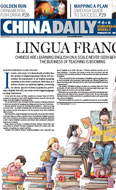Society
Population now stands at 1.341 billion
Updated: 2011-03-01 06:43
By Shan Juan (China Daily)
Slower growth prompts suggestions to loosen family planning policy
BEIJING - The population grew to 1.341 billion by the end of 2010, the National Bureau of Statistics announced on Monday.
The slower growth rate, compared with 2009, has prompted some experts to suggest adjusting the decades-old family planning policy. The current policy limits most urban couples to just one child.
A more accurate figure is expected to come out in April, after the government tallies the results of the census in 2010. A census is carried out once a decade.
"The figure will be very close to the census results," said Yuan Xin, a professor with Tianjin-based Nankai University's population and development institute. He is also a leading member of the National Population and Family Planning Commission (NPFPC).
"It may compel policymakers to adjust current population policies as early as April," he told China Daily on Monday.
He suggested that the adjustment should allow urban couples, if either was a single child, to have a second child.
But as the family planning rules differ regionally, "there won't be a uniform policy change", Yuan said.
Local authorities will act based on the local situation to adjust the policy upon endorsement by the central authorities, he said.
In fact, population policies have undergone constant adjustment. In the late 1990s, almost all cities, except those in Henan province, began to allow urban couples, who were both single children, to have a second baby.
But urbanization and economic development have resulted in people having fewer babies, regardless of restrictions, he said.
The population is projected to peak at 1.5 billion by 2030.
China has maintained a low fertility rate - the total number of children a woman would bear during her lifetime - at about 1.8, for 13 years, official statistics showed.
That means China has generally accomplished the goal set in the late 1970s when the family planning policy was first rolled out, experts said.
Zhao Baige, deputy chief of the NPFPC, said the 30-year-old family planning policy, which prevented 400 million births on the mainland, fueled China's economic miracle and improved people's livelihoods.
However, it has led to an increased percentage of elderly people and labor shortages, experts said.
Zeng Yi, a population economist with Peking University, estimated that with a birthrate of 1.8, the working population in China will dwindle by 10 million people each year after 2025, and the number of young people - aged 20 to 24 - will fall by a quarter in the 2030s.
Cai Yong, an assistant professor at the University of North Carolina, Chapel Hill, was quoted by the AP as saying that allowing more births now will help the country cope with looking after its large and increasing elderly population.
"To have a stable society, you better start now to think ahead of time because it takes 20 to 30 years to have another generation come down the line," he said.
Any change in population policy would have major consequences, said Li Bin, minister of the NPFPC, in December.
"We have to be highly cautious about that," she noted.
Zhao, NPFPC deputy chief, said earlier that the commission was researching "a comprehensive and sustainable population policy, which covers not only the size, but the structure, quality and mix of the population".
E-paper

Lingua franca
Chinese are learning English on a scale never seen before and the business of teaching is booming.
Golden run ahead
Looking abroad
Mapping out a plan
Specials

Sentimental journey
Prince William and Kate Middleton returned to the place where they met and fell in love.

Rent your own island
Zhejiang Province charts plans to lease coastal islands for private investments

Self-made aircraft
An automobile mechanic in Northeast China made a test flight of his self-made aircraft which cost about US$395.




